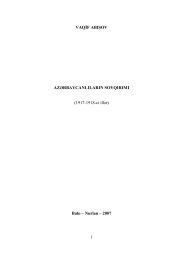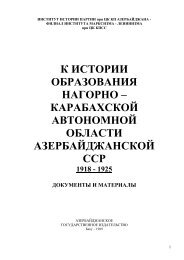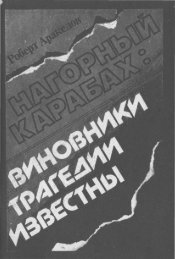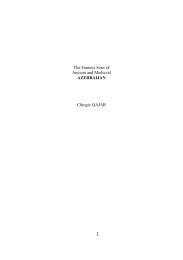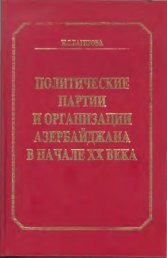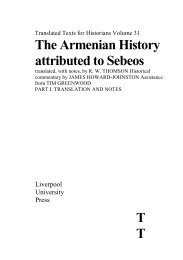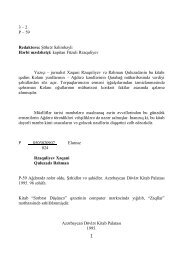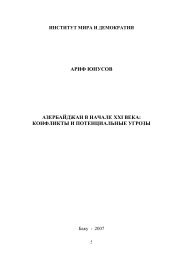ARMENIAN - Erevangala500
ARMENIAN - Erevangala500
ARMENIAN - Erevangala500
You also want an ePaper? Increase the reach of your titles
YUMPU automatically turns print PDFs into web optimized ePapers that Google loves.
ought them safely to Marseilles. From there, they were<br />
free to continue planning and carrying out terrorist attacks.<br />
The raid had only partially fulfilled its purpose. The expected<br />
riots had not materialized. These riots were needed<br />
by the terrorists, because along with the dead and<br />
wounded they would bring a flood o f contributions for<br />
the "Armenian Cause". Other terrorist units therefore<br />
helped out by arranging a number o f bomb explosions in<br />
Galata on August 30.<br />
This time things worked out better, since it was now possible<br />
to dream up tales o f "4000-6000 Armenians killed in<br />
the rioting". Not the least bit o f evidence could be found<br />
to support these figures in the secret report o f the British<br />
Embassy (F. O. 424/188, Nos. 149 and 169). But what<br />
difference did that make?<br />
The Armenians' Last Chance - Blown by the Dashnaks<br />
The Koran school "with the two minarets" is a symbol o f<br />
Erzurum. "Ars er Rum - Land o f the Romans" - was the<br />
name given to the town by the Arab geographer Ibn B attuta.<br />
It was first attacked by the Seljuks in 1049.<br />
In the year 632, the Byzantines held a synod here, in the<br />
course o f which the defeated Armenian principalities<br />
were ordered to accept Greek Orthodoxy. Under the name<br />
"Karen", Erzurum belonged to the Bagratid Empire,<br />
which was tributary to the Caliphs. The Turks established<br />
themselves in Erzurum following their victory at Mantzi-<br />
kert (1071).<br />
68<br />
A model had been created for all future terrorist raids,<br />
complete with hostage-taking, forced publication o f a list<br />
o f demands, and permission for the terrorists to leave the<br />
country - plus all the P. R. that accompanies an action o f<br />
this type.<br />
In 1980 (!), the Briton Christopher Walker wrote in his<br />
book Armenia - The Siti-vival o f a Nation the following passage<br />
concerning the raid on the Ottoman Bank, "Those<br />
Dashnaks who escaped were the lucky ones. They<br />
were put on board the French steamer Gironde and set<br />
sail for France. Their fellow Armenians were left<br />
behind to ex-piate-many times over-the 'crime' o f terrorising<br />
a terrorist society."<br />
In 1914, a Dashnaktsutiun Party Congress was held here.<br />
The Dashnaks regarded Erzurum as the capital o f a future<br />
"Greater Armenia".<br />
The outbreak o f the First World War represents a decisive<br />
turning point in the history o f the Armenian people. It<br />
was on the eve o f the Ottoman Empire's entry into the<br />
war on the side o f the Central Powers (which did not<br />
come until the beginning o f November) that the revolutionary<br />
Dashnaktsutiun held its congress in Erzurum.<br />
There are widely differing accounts o f the events o f the<br />
congress, especially concerning the attitude o f the delegates<br />
towards the Ottoman State.<br />
Hovhannes Kachaznuni, who was later to become prime<br />
minister o f the independent Armenian Republic, did, however,<br />
present a statement concerning this matter to the<br />
Bucharest Congress o f the Dashnaktsutiun in July, 1923:<br />
"At the beginning o f the Fall o f 1914 when Turkey had not<br />
yet entered the war but had already been making preparations,<br />
Armenian revolutionary bands began to be formed in<br />
Transcaucasia (i. e., in Czarist Russia, editor's note), with<br />
great enthusiasm and, especially, with much uproar.<br />
Contrary to the decision taken during their general meeting<br />
at Erzurum only a few weeks before, the A. R. F. (Armenian<br />
Revolutionary Federation - Dash-naksutyun) had active<br />
participation in the formation o f the bands and their future<br />
military action against Turkey ..." After commenting briefly<br />
on the (for Hovhannes Kachaznuni) distressing fact that the<br />
A. R. F. o f Transcaucasia had never stuck to its decisions,<br />
the former prime minister o f the Republic o f Armenia continued:<br />
"It would be useless to argue today whether our bands of<br />
volunteers should have entered the field or not. Historical<br />
events have their irrefutable logic. In the Fall o f 1914 Armenian<br />
volunteer bands organized themselves and fought<br />
against the Turks because they could not refrain themselves<br />
from fighting. This was an inevitable result o f psychology<br />
on which the Armenian people had nourished itself<br />
during an entire generation: that mentality should have



